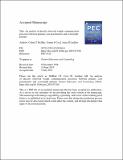Files in this item
An analysis of directly observed weight communication processes between primary care practitioners and overweight patients
Item metadata
| dc.contributor.author | McHale, Calum T. | |
| dc.contributor.author | Cecil, Joanne E. | |
| dc.contributor.author | Laidlaw, Anita H. | |
| dc.date.accessioned | 2020-07-22T23:36:21Z | |
| dc.date.available | 2020-07-22T23:36:21Z | |
| dc.date.issued | 2019-12 | |
| dc.identifier | 253087045 | |
| dc.identifier | ea4cbca3-a893-4885-9951-598b8239f1b3 | |
| dc.identifier | 85069972346 | |
| dc.identifier | 000496130200010 | |
| dc.identifier.citation | McHale , C T , Cecil , J E & Laidlaw , A H 2019 , ' An analysis of directly observed weight communication processes between primary care practitioners and overweight patients ' , Patient Education and Counseling , vol. 102 , no. 12 , pp. 2214-2222 . https://doi.org/10.1016/j.pec.2019.07.010 | en |
| dc.identifier.issn | 0738-3991 | |
| dc.identifier.other | ORCID: /0000-0003-1214-4100/work/59953651 | |
| dc.identifier.other | ORCID: /0000-0002-9274-7261/work/60196512 | |
| dc.identifier.other | ORCID: /0000-0003-4779-6037/work/60196858 | |
| dc.identifier.uri | https://hdl.handle.net/10023/20313 | |
| dc.description | This research was funded by a University of St Andrews 600th Anniversary Doctoral Scholarship. | en |
| dc.description.abstract | Objective To analyse weight-related communication prevalence and processes (content/context) between primary care practitioners (PCPs) and overweight patients within routine primary healthcare consultations. Methods Consultations between 14 PCPs and 218 overweight patients (BMI ≥25 kg/m2) were video recorded. Weight communication was coded using the Roter Interaction Analysis System (RIAS) and the novel St Andrews Issue Response Analysis System (SAIRAS). Communication code frequencies were analysed. Results Weight discussion occurred in 25% of consultations with overweight patients; 26% of these had weight-related consultation outcomes (e.g. weight-related counselling and referrals, stated weight-related intention from patients). Weight discussions were more likely to occur if PCPs provided space to patient attempts to discuss weight (p = 0.013). Longer weight discussions (p < 0.001) and contextualising weight as problematic when PCP/patient-initiated weight discussion (p < 0.001) were associated with weight-related consultation outcomes. Conclusion Weight was rarely discussed with overweight patients, however PCP space provision to patient weight-discussion initiation attempts increased weight discussion. When weight was discussed, increased time and/or contextualising weight as a problem increased the likelihood of weight-related consultation outcomes. Practical implication PCP use of specific communication approaches when discussing, contextualising and responding to patient weight may facilitate weight-related discussion and consultation outcomes and could lead to more effective patient weight management. | |
| dc.format.extent | 482876 | |
| dc.language.iso | eng | |
| dc.relation.ispartof | Patient Education and Counseling | en |
| dc.subject | Overweight | en |
| dc.subject | Obesity | en |
| dc.subject | Direct observation | en |
| dc.subject | Primary healthcare | en |
| dc.subject | Weight management | en |
| dc.subject | Primary care communication | en |
| dc.subject | Weight-related communication | en |
| dc.subject | Communication coding | en |
| dc.subject | RA0421 Public health. Hygiene. Preventive Medicine | en |
| dc.subject | NDAS | en |
| dc.subject | SDG 3 - Good Health and Well-being | en |
| dc.subject.lcc | RA0421 | en |
| dc.title | An analysis of directly observed weight communication processes between primary care practitioners and overweight patients | en |
| dc.type | Journal article | en |
| dc.contributor.institution | University of St Andrews. School of Medicine | en |
| dc.contributor.institution | University of St Andrews. Population and Behavioural Science Division | en |
| dc.contributor.institution | University of St Andrews. Health Psychology | en |
| dc.contributor.institution | University of St Andrews. Education Division | en |
| dc.identifier.doi | https://doi.org/10.1016/j.pec.2019.07.010 | |
| dc.description.status | Peer reviewed | en |
| dc.date.embargoedUntil | 2020-07-23 |
This item appears in the following Collection(s)
Items in the St Andrews Research Repository are protected by copyright, with all rights reserved, unless otherwise indicated.

